Informing/Educating Ourselves About Palestine, Gaza, Israel & the Resistance Movement – a Resource Guide
Current Events
|
Oct 17, 2023
|
12 MIN READ
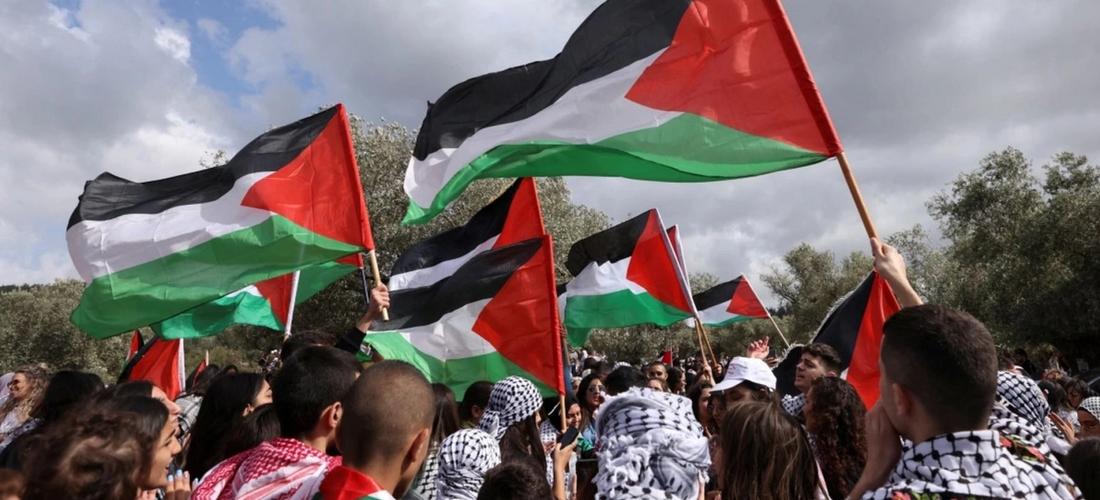
A protest in Chicago in 2021; Image source: Bayan Fares
By Eram Uddin
The recent attack committed by Hamas against Israel and resulting declaration of war by Israel in the Gaza Strip has led to numerous casualties and injuries. With water, food and electricity shut down in Gaza by Israel and directives for Gazans in the north to migrate south to avoid bombings and attacks, the situation is dire.
While this war escalates, we will undoubtedly hear and see the horrors that war brings to everyone. It's hard to discern with media reports what is accurate and what is fake, with news coming, which muddles our ability to educate ourselves and come to informed understandings.
Below is a list of helpful resources to self-educate and be informed when making statements and taking a position. It is with hope and prayer that this resource can facilitate tough conversations in our civil engagement and provide more context to the current crisis while calling on our leaders to uphold the values of human rights and social justice.
(Click here for a comprehensive resource guide for talking with and educating your kids about Palestine/Israel.)
General
1. How Do We Talk To Our Children About Palestine: A great starting point with advice on how to speak to your kids on Palestine from a Black American woman who opposes the apartheid regime in Israel but also advises a nuanced approach in discussing with your kids the situation.
2. List of Children’s Books on Palestine: (fiction and nonfiction)
3. Curation of thirty indispensable books on Palestine: (fiction and nonfiction)
4. Institute for Middle East Understanding (IMEU): This independent non-profit organization provides journalists with quick access to information about Palestine and Palestinians as well as expert sources, both in the United States and in the Middle East. Through its website and its staff, the IMEU works with journalists to increase the public's understanding about the socio-economic, political and cultural aspects of Palestine, Palestinians and Palestinian Americans. It's a great resource on books, media, and live coverage.
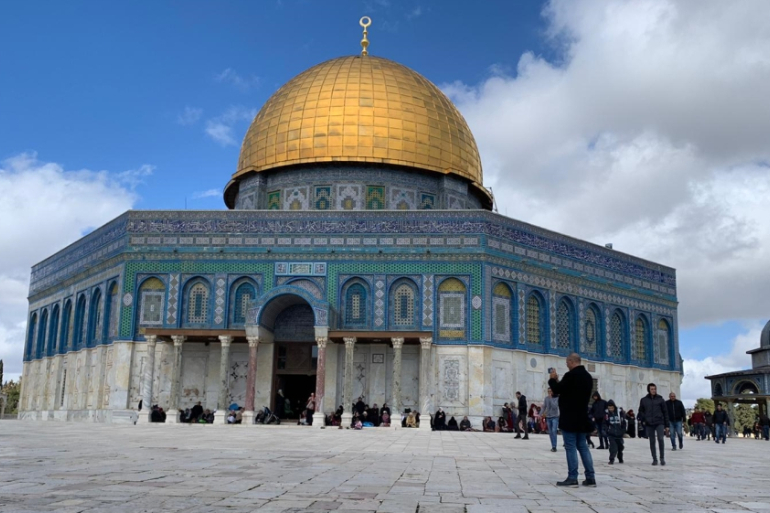
Al Aqsa Mosque
5. Israeli Palestinian conflict explained: an animated introduction to Israel and Palestine: Created by Jewish Voice for Peace, this XXX explains that the conflict is essentially about land and human rights, not religion and culture. It's an excellent mini-primer into the modern day conflict, easy to understand and historically accurate. It also discusses why the US-backed peace process has been an impediment to peace and what you can do to make a difference. Endorsed by Palestinian, Israeli, and American scholars and peace activists.
6. Conflict in Israel and Palestine: Crash Course World History 223: An excellent video that presents a concise but thorough historical overview of the Palestinian-Israeli conflict by author and historian, John Green. He presents the complicated history and current conflict with facts in under 13 minutes.
Contextualizing Current Conflict
1. An open letter to mental health professionals: October 15, 2023
2. Chicago City Council Meeting: October 13, 2023; fact-based comments by filmmaker Merawi Gerima at the Chicago City Council meeting, where they were to vote on a resolution in support of Israel. A must listen.
3. MC Abdul – Shouting at the Wall: Palestinian boy from Gaza raps about life under occupation in 2021. This resonates with the current reality on the ground, with 50 percent of Gaza’s population being children. (Current population is said to be two million people). You can read more about Abdul in a recent article in the National News and The National. “My message is about peace. Not the political side of it,” he said. “I don’t understand what politics is – the thing I’m trying to say is that I want the children of the world to live in peace and harmony and I want to be the voice of the children in Palestine. I want to show people about my life, and what it means to be a rapper in Gaza City.”
3. The Pen & The Sword: This latest song by MC Abdul, a boy from Gaza, is a reflective song that looks at the lost dreams of youth in Gaza. The video is powerful and moving. “You should be building more schools not prisons / They bombed us. It ain't even make the news in y’all city,” he raps. “He could’ve been a scholar but he’s a child of Gaza. Missile hit his home and crushed it, killing his ba ba (father).”
4. Life Under Blockade: A Collection of Essays (2019): This booklet is a collection of essays written by young people in Gaza as part of an American Friends Service Committee (AFSC) essay contest. It includes a study guide to generate discussions about the blockade on Gaza and the youth essays, which are a read.
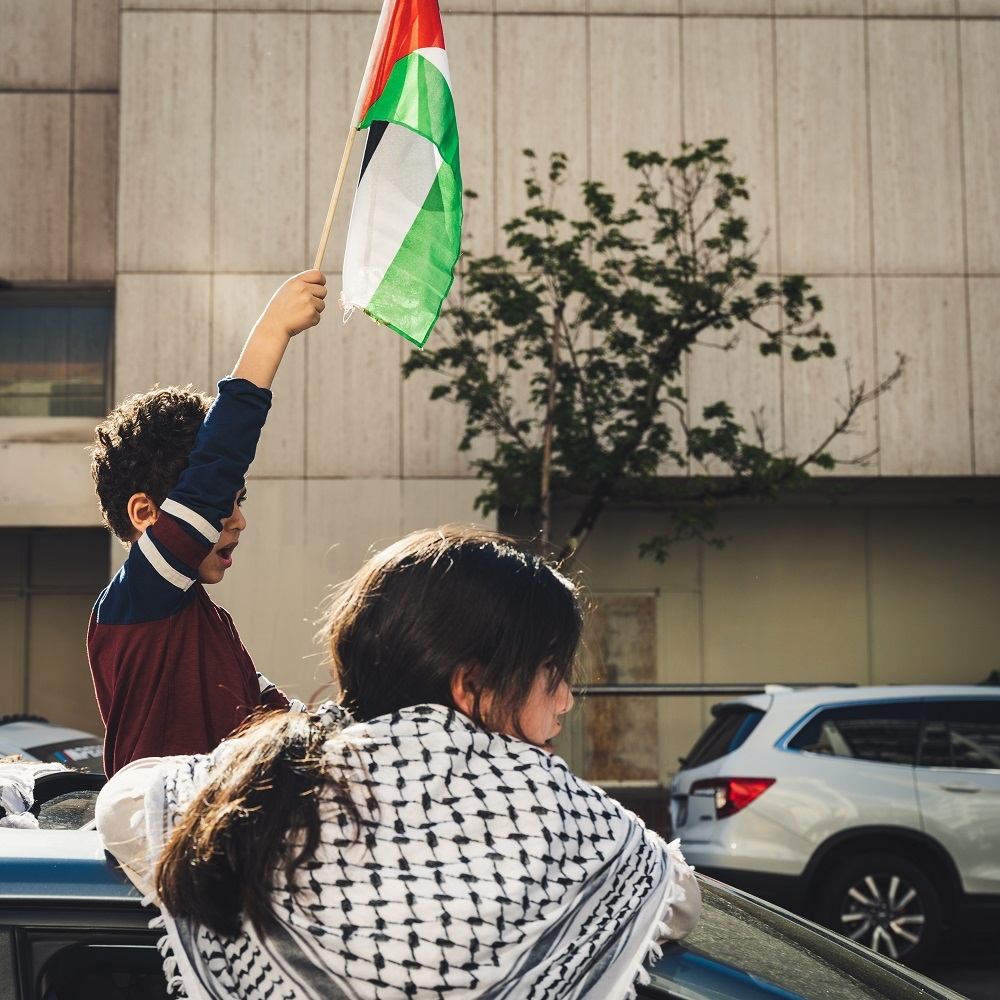
Image source: Pexels
5. Look Into My Eyes: Song by Outlandish that was released 13 years ago and captures the daily brutality against Palestinians through a theatrical performance by children. Emotional video while still remaining upbeat.
6. Children of the Ghetto, My Name is Adam by Elias Khoury: This is a New York Times book review of a historical fiction novel that explores the silencing of Palestinian trauma.
7. Promises Documentary: Emmy award-winning documentary that humanizes the conflict. Available to rent/buy on Apple TV | Amazon. Study Guide with Lesson Plans available for teachers. Rather than focusing on political events, the seven children featured in "Promises" offer a compelling human portrait of the Israeli and Palestinian conflict. The film draws viewers into the hearts and minds of Jerusalem's children by giving voice to those captured by the region's hatreds as well as those able to transcend them. Audiences will engage with Palestinian and Israeli kids, coming to know them as multi-dimensional people, not as stereotypes perpetuated by the mainstream media.
8. The Conflict Zone: In a new series of four, eight-minute videos, National Geographic Explorer Aziz Abu Sarah meets with people from both sides of the Israeli-Palestinian conflict, to better understand and communicate how this international dispute impacts their everyday lives. Use these videos to give students a broader understanding of both the Israeli-Palestinian conflict and the concept of conflict resolution.
Learning About the Humanitarian Crisis
1. United Nation Human Rights: 10/14/23; UN expert warns of new instance of mass ethnic cleansing of Palestinians and calls for immediate ceasefire.
2. Doctors Without Borders APAC Statement: 10/13/23; Watch the full statement. Meinie Nicolai, the General Director of MSF states, “The 24-hour notice that people in Northern Gaza must leave their land, homes and hospitals is outrageous – this represents an attack on medical care and on humanity. We have consistently seen dehumanizing language and this violence is a manifestation of that. Unprecedented doesn’t even cover the medical humanitarian impact. Gaza is being flattened; thousands of people are dying; this must stop now. We are talking about more than a million human beings. We condemn Israel’s demand in the strongest possible terms.”
3. In Gaza, Palestinians have no safe place from Israel’s bombs: Through interviews, the CNN article explains the devastating impact of Israeli military aggression on Palestinians.
4. Israel blockade of Gaza is inhumane despite ghastly attack by Hamas: A USA Today op-ed by Rami Nashashibi and Rabbi Andrea C. London in which the authors share their experience traveling Jerusalem together on an interfaith trip, where their last day was the day of the attack. They shed light on the attack from first-person narrative and the impending humanitarian catastrophe.
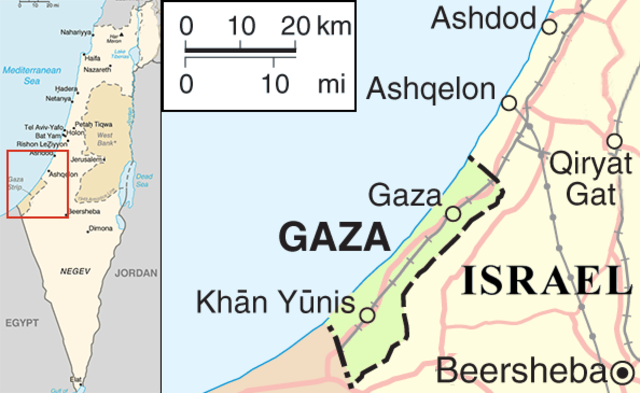
Map of Gaza; image source: Wikimedia Commons
5. Gaza City faces a humanitarian crisis as power plant shuts down: 10/12/23; This NBC News report focuses on the humanitarian crisis growing in Gaza after Israel cut off all resources and Gaza City’s only power plant has run out of fuel, putting hospitals at risk. Dr. Justin Dalby, who is based in the Gaza Strip with Doctors Without Borders, explains how the loss of power will impact civilians.
6. What a “complete siege” of Gaza will mean for Palestinians: 10/11/23; a VOX report on how Gaza was already under siege. Now it will get worse.
7. Eleven workers with UN refugee agency, five IFRC members killed in Gaza: 10/11/23; This article from Reuters News reports that UNRWA (the United Nations Relief and Works Agency for Palestine Refugees in the Near East) said nearly 175,500 internally displaced people were sheltering in 88 of its schools across Gaza. "The numbers continue to increase as airstrikes continue from the Israeli Air Forces," it said. "UNRWA staff are working around the clock to respond to the needs of the displaced in the shelters. However, some are overcrowded and have limited availability of food, other basic items and potable water."
UNRWA said two of its schools had been affected by airstrikes, bringing the number of its facilities impacted by the conflict to 20. All of the schools it runs across the Gaza Strip remain closed.
8. UNICEF State of Palestine Appeal: Humanitarian Action for Children: UNICEF’s Humanitarian Action for Children appeal helps support the agency’s work as it provides conflict- and disaster-affected children with access to water, sanitation, nutrition, education, health and protection services. Around 2.1 million people in the State of Palestine need humanitarian assistance, among them 1 million children. The prolonged conflict, renewed escalations, and 15 years of closure in the Gaza Strip have contributed to the dire living conditions and restriction of movements, including children and goods.
9. With Gaza Sealed Off, Palestinians Face Aid Freezes Too: Amid Humanitarian Crisis, Cutting Off Vital Lifeline Would Be Damaging: This Human Rights Watch article explains the impact of cutting humanitarian aid on the Palestinian people. Standing against Hamas’ assault does not require cutting off vital lifelines for the Palestinian people.
10. Resources on H.R. 2407, Promoting Human Rights for Palestinian Children Living Under Israeli Military Occupation Act: Congresswoman Betty McCollum (DFL-Minn.) has introduced legislation to promote human rights for Palestinian children by ending abusive Israeli military detention practices. Her legislation, the Promoting Human Rights for Palestinian Children Living Under Israeli Military Occupation Act, H.R. 2407, amends a provision of the Foreign Assistance Act, known as the "Leahy Law," to prohibit funding for the military detention of children in any country, including Israel. This resource page provides the full resolution and links to others explaining the need for our elected officials to support this measure.
11. Fact Sheet for H.R. 2407: This fact sheet outlines the resolution in simple terms. The brutality and trauma inflicted on Palestinian children by Israel’s occupation and system of military detention in the West Bank has been extensively documented by credible international human rights monitors, including Human Rights Watch, Amnesty International, Israel’s B’Tselem, United Nations Children’s Fund (UNICEF), Defense of Children/Palestine, and the U.S. Department of State.
Information on the Current Crisis in Palestine/Israel
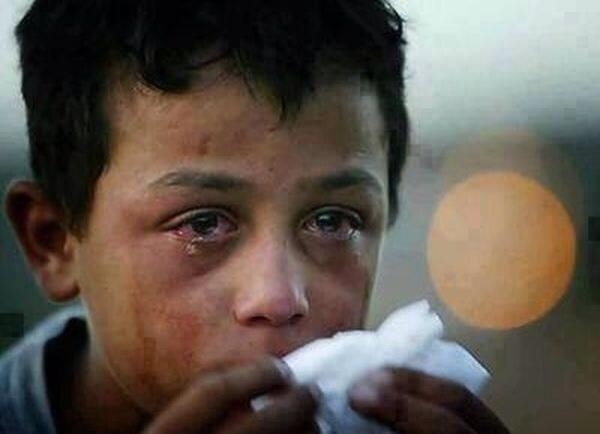
An orphan in Gaza; image source: Twitter
1. ‘Not in my name:’ Group of metro Detroit Jews denounces Israel siege on Gaza; 10/16/23; In this Detroit Free Press op-ed, a group of about 100 Michigan Jewish people called on Democratic U.S. Sens. Gary Peters and Debbie Stabenow to help “stop the genocide of Palestinians.”
2. A Threshold Crossed: Israeli Authorities and the Crimes of Apartheid and Persecution: The 213-page report by Human Rights Watch examines Israel’s treatment of Palestinians. It presents the present-day reality of a single authority, the Israeli government, ruling primarily over the area between the Jordan River and Mediterranean Sea, populated by two groups of roughly equal size, and methodologically privileging Israelis while repressing Palestinians, most severely in the occupied territory. This 2021 HRW report details Israeli persecution of Palestinians for over 50 years to the extent that they are considered as crimes against humanity of apartheid and persecution.
3. Israel’s apartheid against Palestinians is a cruel system of domination and a crime against humanity: This comprehensive report by Amnesty International sets out how massive seizures of Palestinian land and property, unlawful killings, forcible transfer, drastic movement restrictions and the denial of nationality and citizenship to Palestinians are all components of a system that amounts to apartheid under international law.
“Our report reveals the true extent of Israel’s apartheid regime. Whether they live in Gaza, East Jerusalem and the rest of the West Bank, or Israel itself, Palestinians are treated as an inferior racial group and systematically deprived of their rights. We found that Israel’s cruel policies of segregation, dispossession and exclusion across all territories under its control clearly amount to apartheid. The international community has an obligation to act,” said Agnès Callamard, Amnesty International’s Secretary General
4. There is nothing surprising about Hamas’s operation: This op-ed piece on the recent crisis that gives an overview of what led to the current crisis. Author references historical events and current living conditions in occupied Gaza. Imperative to know to understand the “why” and what led to the recent violence.
5. Princeton scholars and other experts discuss Israel and Gaza; 10/12/23; Moderator Razia Iqbal, John L. Weinberg/Goldman Sachs & Co. Visiting Professor and Lecturer; Panelists: Dan Kurtzer, Lecturer and S. Daniel Abraham Professor of Middle East Policy Studies; former U.S. ambassador to Israel | Salam Fayyad, Visiting Senior Scholar and Daniella Lipper Coules '95 Distinguished Visitor in Foreign Affairs; former prime minister of the Palestinian Authority | Mona Yacoubian, Vice President of the Middle East and North Africa Center at United States Institute of Peace
6. Israel and the Occupied Territories: Targeting civilians leads to further spirals of violence and hatred: The International Committee of the Red Cross, permanently present in Israel and the occupied territories since 1967, has long been witness to the devastating killing of civilians leading to further spirals of violence and hatred. This letter by its President, Mirjana Spoljaric, calls on humanitarian workers free passage into Gaza to assist those in need.
7. Red Cross Federation Says Five Members Killed In Gaza, Israel: This Barrons article reports growing casualties on both sides. Humanitarian aid workers from both sides have lost lives.
8. Palestinian Red Crescent says Israeli forces deliberately killed four medics: 10/12/23; The Palestinian Red Crescent says in this Al Jazeera English article that Israel has deliberately killed four paramedics who were tending to the wounded in and around Gaza. The society's director general says one was shot in the back as he was loading the dead into body bags.
9. Your kids’ questions on Israeli-Palestinian violence, answered: Very informative and thoughtful answers to questions from young teens regarding the conflict. It presents a broader progressive American Jewish perspective on the conflict than the Zionist perspective that is being pushed out by mainstream media.
*The Forward is an influential American Jewish publication with a politically progressive editorial focus and showcases a broad range of perspectives. One of its columnists, Muhammad Shehada, is from Gaza, and wrote powerfully about what it’s been like to watch the latest violence unfold from Sweden, where he is studying.
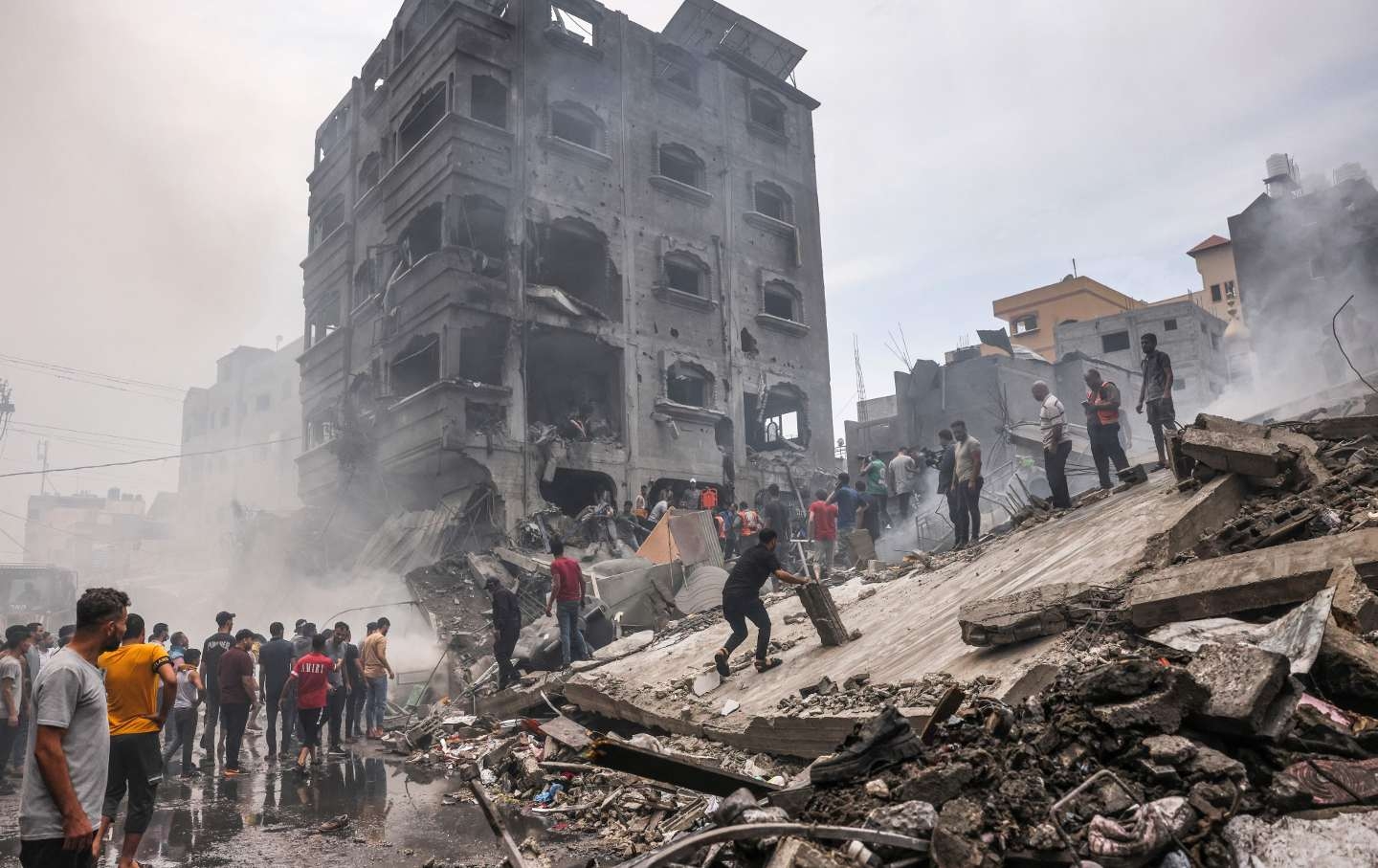
Image source: Twitter and Getty images
10. Is Israel Guilty of Apartheid Against Palestinians? A concise explanation of apartheid and the conditions for it and whether they truly apply to Israel or not.
11. Lies on Social Media Inflame Israeli-Palestinian Conflict: Misinformation has flourished on Twitter, TikTok, Facebook and other social media about the violence between Israelis and Palestinians.
12. Real or Fake? Verifying Video Evidence in Israel and Palestine: Human Rights Watch's task is to develop a comprehensive picture of the abuses that have occurred and who should be held accountable. This article explains how HRW’s digital investigation team is working to build evidence of the current conflict. Over the coming weeks and months, they will share their research findings in tandem with on-the-ground researchers. They are just beginning to build a body of evidence to document the unfolding abuses.
Historical Relevance to Understanding What's Happening in Palestine/Israel
1. Malcolm X’s Moral Courage and the Challenge of Palestine: Dr. Omar Suleiman explains that moral courage is not often found within the confines of our rigid partisan establishment lines. Neither political party has a monopoly on morality. Courage is displayed precisely when we rise up against the comfortable, prevailing view of our times.
2. In Israel’s Rising Violence, Ripples From 1948: A historical analysis of how the town of Lydda posed an early test of how the Israeli state would treat Palestinians. The article critiques that it is a legacy playing out today in violence between Jews and Arabs in Lod, as it’s now known.
3. Story of Palestine by Eman Askar: The Story of Palestine folk song can jumpstart a conversation with kids. The song uses rhythmic lyrics to illustrate the history of Palestine and the illegitimate Israeli occupation. It presents historical accounts in a simplified manner that may be beneficial when speaking with young children. Using the song as a starting point will also allow your children to ask you more specific questions if they wish to.
4. The Israel-Palestine conflict: a brief, simple history (Vox, 2016): This ten minute video providing context to the current crisis. It explains that while religion is involved, the conflict is mostly about two groups of people who claim the same land, and it really only goes back about a century, to the early 1900s. At its heart, it is a conflict between two self-determination movements – the Jewish Zionist project and the Palestinian nationalist project – that lay claim to the same territory.
What resources have been helpful to you for understanding what's happening in Palestine/Israel? Share with us in the comments below.
Eram Uddin is an educational consultant specializing in curriculum and program development with a background in social justice and multicultural education. She also works as the editorial coordinator for Publications at Zaytuna College. She holds a BA in History from Ohio State University and a Masters degree in Education from the University of Michigan, Ann Arbor. Eram is also an active community organizer in Detroit, Michigan and is a founding board member of a local educational religious non-profit, Beacon Foundation. She lives in metro-Detroit with her husband and three children.
Subscribe to be the first to know about new product releases, styling ideas and more.
What products are you interested in?

